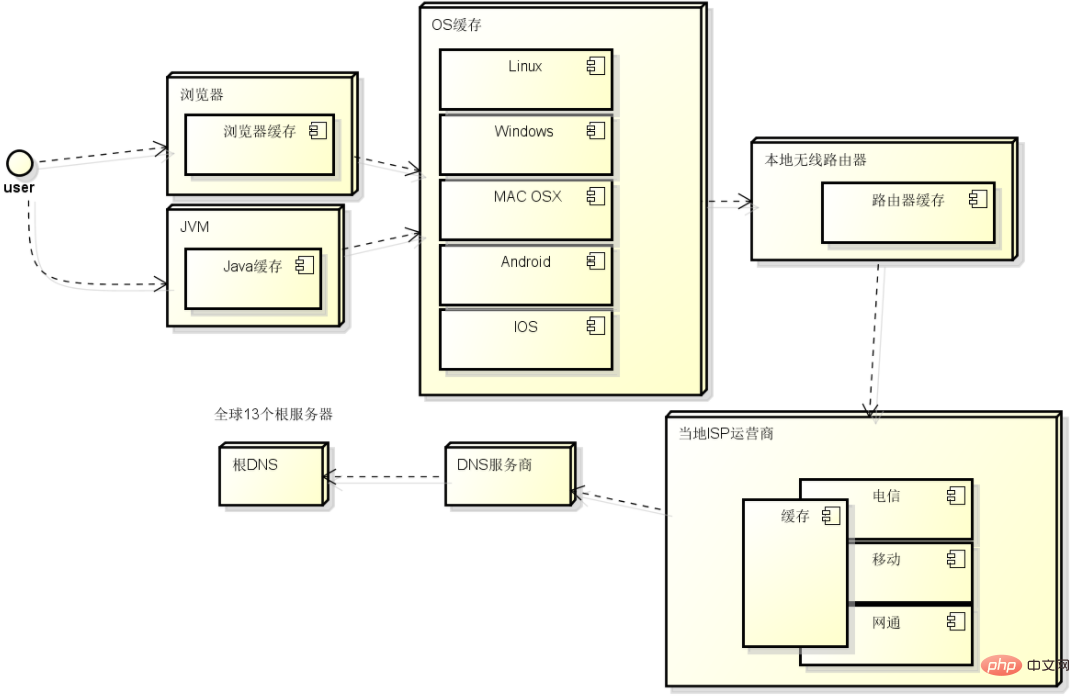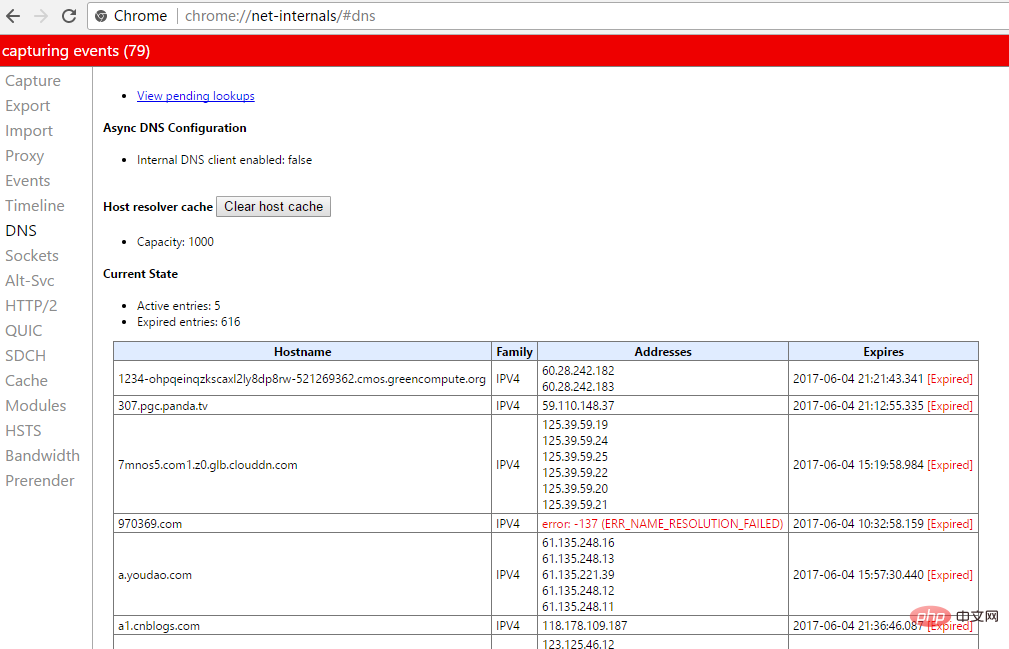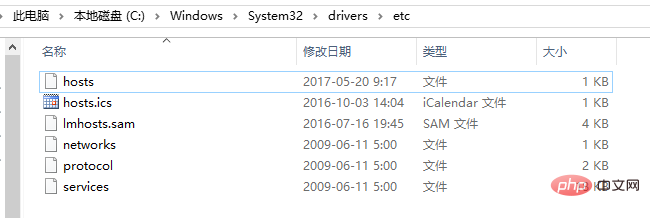

This article will introduce the domain name resolution module DNS in detail. It has certain reference value. Friends in need can refer to it. I hope it will be helpful to everyone.
Related recommendations: "nodejs Tutorial"
Working Principle
Open the browser and go to The moment you enter the URL in the address bar above and press Enter, a lot of things happen. First of all, the computer only understands 0 and 1, which means that the computer does not understand human alphabetical addresses. It only understands IP addresses. If it is IPv4, it is four groups of 8-bit binary numbers. For human convenience, there needs to be a service that translates URLs into IP addresses, which is DNS
The entire DNS acquisition process is cached layer by layer

chrome://net-internals/#dns
 ## in the address bar 2. Search the operating system’s own DNS cache
## in the address bar 2. Search the operating system’s own DNS cache
3. Read the local HOST file. The path under Windows is generally
c:\Windows\System32\drivers\etc\hosts
 4. Initiate a DNS system call to the broadband operator ISP, and the ISP server will check its own cache
4. Initiate a DNS system call to the broadband operator ISP, and the ISP server will check its own cache
5. If it is not found yet, the ISP server will replace it The local computer initiates an iterative DNS resolution request
6. If it still fails, the resolution fails
Local resolution The dns module contains two types of functions, one of which is a function that uses underlying operating system tools to perform domain name resolution and does not require network communication. There is only one such function: dns.lookup()
[dns.lookup(hostname[, options], callback)】
This method resolves the domain name (such as 'cnblogs.com') The first record found is A (IPV4) or AAAA (IPV6). Parameter options can be an object or an integer. If no options are provided, both IP v4 and v6 addresses are acceptable. If options is an integer, it must be 4 or 6
The options parameter contains the following attributes
family:地址协议族,必须为4或6的整数 hints:设置getaddrinfo的标志,dns.ADDRCONFIG 或者 dns.V4MAPPED(ipv4映射成ipv6) all:false(默认),布尔值,如设置为true,则返回IP数组,否则返回单个IP地址
{
family: 4,
hints: dns.ADDRCONFIG | dns.V4MAPPED
}The callback function contains parameters (err, address, family). The address parameter represents an IP v4 or v6 address. The family parameter is 4 or 6, indicating the address family (not necessarily the value passed into lookup before). When an error occurs, the parameter err is the Error object, and err.code is the error code
[Note] err.code is equal to 'ENOENT', which may be because the domain name does not exist, or other reasons, such as no available files. Descriptor
var dns = require('dns');
dns.lookup('www.cnblogs.com', function(err, address, family){
console.log(err);//null
console.log(address);//218.11.2.249
console.log(family);//4});The same domain name may correspond to multiple different IPs. You can obtain it by setting options = {all: true}
var dns = require('dns');
dns.lookup('www.qq.com',{all:true}, function(err, address, family){
console.log(err);//null/*[ { address: '125.39.240.113', family: 4 },
{ address: '61.135.157.156', family: 4 } ] */
console.log(address);
console.log(family);//undefined});[dns.lookupService(address, port, callback)]
Corresponding to lookup, the lookupService() method performs the following steps from the IP address And reverse resolution from port to domain name
The parameters of the callback function of this method are (err, hostname, service). hostname and service are both strings (such as 'localhost' and 'http'). When an error occurs, the parameter err is the Error object, and err.code is the error code
var dns = require('dns');
dns.lookupService('127.0.0.1',80,function(err, hostname, service){
console.log(err);//null
console.log(hostname);//bai
console.log(service);//http});Network analysis Except for dns.lookup() All functions in the dns module need to connect to the actual DNS server for domain name resolution, and always use the network to perform DNS queries
[dns.resolve(hostname[, rrtype], callback)]
This method parses a domain name (such as 'cnblogs.com') into an array of rrtype specified record types
The valid rrtypes value is:
'A' (IPV4 地址, 默认)'AAAA' (IPV6 地址)'MX' (邮件交换记录)'TXT' (text 记录)'SRV' (SRV 记录)'PTR' (用来反向 IP 查找)'NS' (域名服务器 记录)'CNAME' (别名 记录)'SOA' (授权记录的初始值)
The callback parameter is
(err, addresses). The type of each item in addresses depends on the record type. When an error occurs, the parameter err is the Error object, and err.code is the error code <div class="code" style="position:relative; padding:0px; margin:0px;"><pre class='brush:php;toolbar:false;'>var dns = require(&#39;dns&#39;);
//IPV4
dns.resolve(&#39;www.qq.com&#39;,function(err,address){
console.log(address);//[ &#39;125.39.240.113&#39;, &#39;61.135.157.156&#39; ]
});
//IPV6
dns.resolve(&#39;www.qq.com&#39;,&#39;AAAA&#39;,function(err,address){
console.log(address);//[ &#39;240e:e1:8100:28::2:16&#39; ]
});
//别名
dns.resolve(&#39;www.qq.com&#39;,&#39;CNAME&#39;,function(err,address){
console.log(address);//undefined
});</pre><div class="contentsignin">Copy after login</div></div>[dns.resolve4(hostname, callback)]
Similar to dns.resolve(), only IPv4 (A record) can be queried
var dns = require('dns');
dns.resolve4('www.qq.com',function(err,address){
console.log(address);//[ '125.39.240.113', '61.135.157.156' ]
});【dns.reverse(ip, callback)】
This method is used for reverse To resolve the IP address, return the domain name array pointing to the IP address. Callback function parameters (err, hostnames). When an error occurs, the parameter err is the Error object, and err.code is the error code
var dns = require('dns');
dns.reverse('114.114.114.114',function(err,hostnames){
console.log(hostnames);//'public1.114dns.com'
});For more programming-related knowledge, please visit:
Programming TeachingThe above is the detailed content of Nodejs learning to understand the domain name resolution module DNS. For more information, please follow other related articles on the PHP Chinese website!